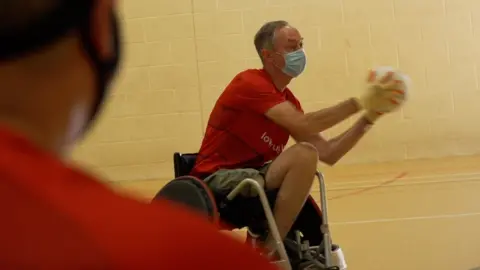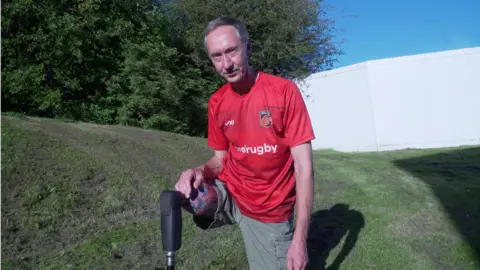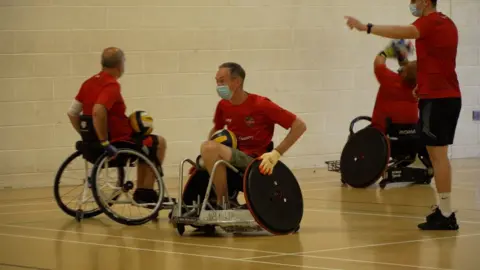Amputee wins better prosthetics funding access in Wales
A wheelchair rugby player who became tired of "ministers' excuses" has won his fight to improve access to better prosthetics in Wales.
David Bradley urged the Welsh government to provide the same electronic joints as available on the NHS in the rest of the UK.
His petition secured a £700,000 fund to be provided by three specialist centres in Cardiff, Swansea and Wrexham.
Mr Bradley said it was a victory for "people power".
His campaign is now going to be used as a case study by the Welsh government on how people in Wales can influence what happens in the Senedd.
The former health and safety officer from Abergavenny saw his life transform in the space of 24 hours one Friday in 2018.
What he thought was a bought of sciatica back pain while at work turned out to be an aneurism.
By the next morning he was undergoing emergency surgery and a week later, his right leg was amputated just above the knee.
"I was given the best prosthetic that was available in Wales at the time, but I soon realised that had I been in England, or Scotland or Northern Ireland, then I would have had an electric joint that is so much better," he said.
"Ministers in Wales had been saying they were going to review the policy since 2016 but never had.
"Because of that, treatment in Wales had lagged behind the rest of the UK for almost a decade.

"I was just so annoyed. Why should there be this discrepancy within the UK? I felt there was an injustice and it wasn't right.
"The first response I had just felt like the health minister and services were just playing themselves off against each other, so I started the petition for a review."

More than 550 people signed the petition calling for funding to enable limb amputees within Wales to have microprocessor prosthetics, as available in England, Scotland and Northern Ireland.
In March, the then-Health Minister Vaughan Gething responded to the petitions committee confirming a fund to be delivered by three specialist Artificial Limb and Appliance Centres (ALACs) across Wales.
"I was delighted because I knew how much this would mean for anyone in Wales with a prosthetic," said Mr Bradley.
"I guess it's a great example of what you can do if you focus, structure a good argument and gather support. You really can change things.
"In not accepting weak excuses and arguments and challenging ministerial responses we have now achieved a result that will transform a lot of people's lives in Wales."
His campaign has been hailed by politicians as an example of how people in Wales can influence government policy.
Speaking at the latest petitions committee hearing on Friday, Luke Fletcher MS said Mr Bradley should be used as a case study for others.
He said: "I often worry that people think their voices are not heard, but here's an example where their voices have been heard and has an impact in the Senedd, and on what the Welsh government does."

Ian Massey, clinical lead prosthetist at Rookwood Hospital, Cardiff, was delighted at the outcome.
He added: "These technologically advanced devices will significantly enhance the quality of life of many of the patients who attend the specialist prosthetic service centres [and] we look forward to developing this service."
Why electric joints are better than mechanical
Mechanical joints work like a "piston" in the leg which offers some resistance as the user walks, however its versatility is limited, said Mr Bradley.
In contrast, the microprocessors in the electric joint are far more responsive, he said, by sensing any pressure and applying a series of "mini-breaks".
"It's a massive difference, almost life-changing," said Mr Bradley.
"The old joint would cause so many problems that it would limit where you could go. I used to avoid walking down any slopes - which is difficult when you live on a hill!"
A report for NHS England highlighted studies in Italy and the Netherlands that found a long-term reduction in medical and care costs for amputees using microprocessor-controlled prosthetic knees.
The Welsh government said it encouraged all those who are eligible to discuss accessing the new fund at their next assessment with their prosthetists.

- THE ROAD TO TOKYO: Paralympian Tanni Grey-Thompson charts the road to the 2021
- SOCIAL MEDIA & SPORT: Vicki Blight investigates the impact of social media in sport

